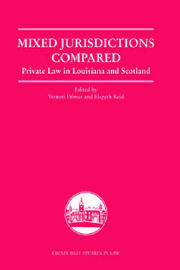Book contents
- Frontmatter
- Contents
- Preface
- List of Contributors
- List of Abbreviations
- Table of Cases
- 1 Praedial Servitudes
- 2 Title Conditions in Restraint of Trade
- 3 Servitudes: Extinction by Non-Use
- 4 Inheritance and the Surviving Spouse
- 5 Ownership of Trust Property in Scotland and Louisiana
- 6 The Legal Regulation of Adult Domestic Relationships
- 7 Impediments to Marriage in Scotland and Louisiana: An Historical-Comparative Investigation
- 8 Contracts of Intellectual Gratification – A Louisiana-Scotland Creation
- 9 The Effect of Unexpected Circumstances on Contracts in Scots and Louisiana Law
- 10 Hunting Promissory Estoppel
- 11 Unjustified Enrichment, Subsidiarity and Contract
- 12 Causation as an Element of Delict/Tort in Scots and Louisiana Law
- 13 Personality Rights: A Study in Difference
- Index
10 - Hunting Promissory Estoppel
Published online by Cambridge University Press: 12 September 2012
- Frontmatter
- Contents
- Preface
- List of Contributors
- List of Abbreviations
- Table of Cases
- 1 Praedial Servitudes
- 2 Title Conditions in Restraint of Trade
- 3 Servitudes: Extinction by Non-Use
- 4 Inheritance and the Surviving Spouse
- 5 Ownership of Trust Property in Scotland and Louisiana
- 6 The Legal Regulation of Adult Domestic Relationships
- 7 Impediments to Marriage in Scotland and Louisiana: An Historical-Comparative Investigation
- 8 Contracts of Intellectual Gratification – A Louisiana-Scotland Creation
- 9 The Effect of Unexpected Circumstances on Contracts in Scots and Louisiana Law
- 10 Hunting Promissory Estoppel
- 11 Unjustified Enrichment, Subsidiarity and Contract
- 12 Causation as an Element of Delict/Tort in Scots and Louisiana Law
- 13 Personality Rights: A Study in Difference
- Index
Summary
Promissory estoppel came into Louisiana silently, as it pervaded the rest of the United States, under the guises of other doctrines. Even after Williston discovered the hidden current in the American case law and named it “promissory estoppel” (to distinguish it from equitable estoppel), the doctrine remained unacknowledged in Louisiana. With its Civil Law heritage Louisiana had no need to fix Common Law problems, it was thought, and promissory estoppel was only a tool for Common Law repairs. This thinking turned, though, and the state has now enshrined promissory estoppel in the Civil Code. In Scotland, on the other hand, a distinctive law of promise had been introduced centuries earlier. Even Adam Smith and David Hume interested themselves in promises and their place in the law, and in Smith's case, in Scots law particularly. This doctrine would seem to leave no room for promissory estoppel, which has therefore been kept out. This background, and these differing results, made promissory estoppel an enticing prospect for a study of two mixed jurisdictions, each of which is characterised by its own internal relationship between Civil Law and Common Law. The story told here, comparing Louisiana and Scotland, is an examination of the intricate relationship between these two sets of relationships.
APOLOGIA FOR A DOCTRINAL STUDY OF PROMISSORY ESTOPPEL
Promissory estoppel is marked by three characteristics that make it peculiarly interesting for comparative study. Its father was the strict doctrine of consideration, and its mother was the just pressure to decide cases fairly despite technical strictures.
- Type
- Chapter
- Information
- Mixed Jurisdictions ComparedPrivate Law in Louisiana and Scotland, pp. 281 - 321Publisher: Edinburgh University PressPrint publication year: 2009

